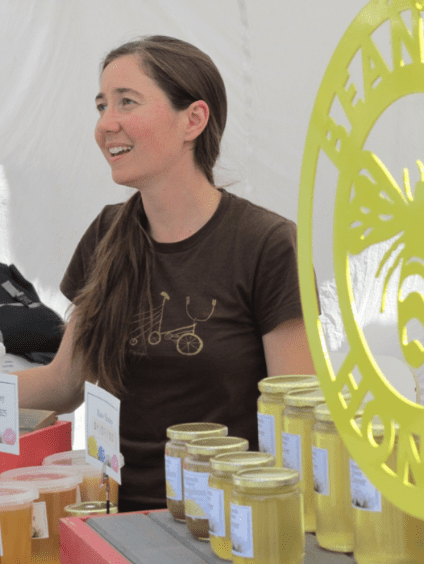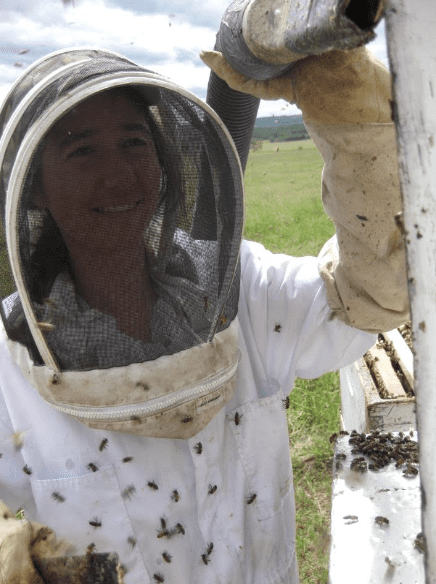A colony begins with a queen bee and a few thousand worker bees. Colonies requeen themselves naturally when the queen passes away, so therefore generations of bees can stem from one colony! Bees are extremely good at regulating the inside temperature of their hives by exercising their flight wings; a mechanic similar to warming up an engine by revving it. Tracey says there are two types of colonies: a natural swarm, or commercially produced hive ready to produce honey. Colonies are very good at surviving indefinitely, as long as there is prevention of diseases, starvation, or becoming queenless. This is where the importance of being a beekeeper comes from; protect your bees and you get rewarded with honey!
What to Know About Beekeeping:
Tracey says the most important thing about beekeeping is that beekeeping is a type of farming where you continue to learn. There is also a lot of juggling as a farmer: repairing machines, bookkeeping and selling products are all integral to farming.
One common question Tracey thinks people should know about beekeeping is that you get used to the stings, and that there is a lot of colony management among the bees, which has surprised her along her journey. Another surprise Tracey faces with beekeeping is the importance of weather patterns: “Nectar flows are highly weather dependent so honey yields are greatly affected by cool, wet weather, late springs, and early fall frosts.”
Beekeeping success goes hand in hand with their prime source of food: flowers. Tracey has mastered the art of studying the bee’s behaviour and she can tell when certain plants are producing nectar and pollen based on how the bees are behaving. Tracey’s bees love willow, dandelions, sweet clover, clover, and alfalfa. Although not in her area, honey bees also favour canola – they prefer it to any other plant. Her peak months for honey production extend throughout the summer to mid September.

Insider Information: How Tracey Beekeeps
- Tracey keeps her bees without the use of synthetic chemicals or antibiotics.
- Tracey likes to minimize the amount of sugar syrup she feeds the bees in the fall.
- Tracey likes to manage her bee populations in time with the season, which has become difficult due to recent unpredictable weather patterns in Alberta.
- She has begun to implement new management techniques that focus on the mid-seasons, which she thinks may improve bee health later in the honey season.
- Tracey thinks documenting bee-keeping on social media is effective for communicating the lifestyle of bee-keeping. Some great social media beekeepers she knows are U of Guelph and Ian Steppler from Manitoba.
Tracey’s aspirations in becoming another farmer in her family, completely reinventing her family’s farm and branching out into a challenging yet rewarding form of farming is incredibly impressive. Her expertise on her bees and overcoming the curveballs farming can throw to farmers in Alberta shows the strength she has, and it is especially apparent in her quality honey.
To learn more about Tracey Smith and Beanstalk Honey, check out her website for more information: https://northcookinglake.com/about/
Check out the other stories in this series

